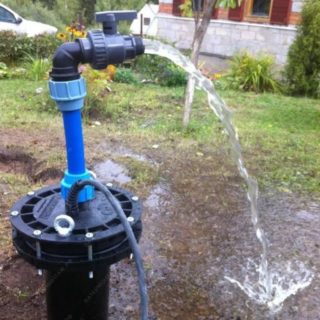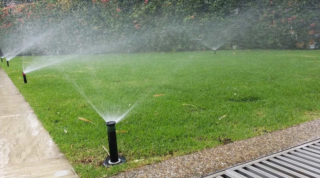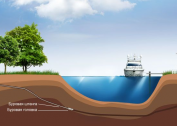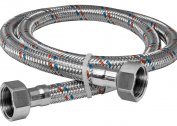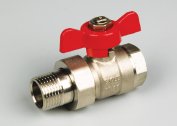The availability of suburban land requires the organization of an autonomous source of water supply. More often it’s a well. From it, the resource goes both for household and household needs. The owners of the plots irrigate the garden with cold water from the well or irrigate the lawns and gardens with it. This effect on crops is not always favorable.
Is it possible to water a garden and lawn with water from a well
Flora is very demanding for observing biorhythms, temperature conditions, and the chemical balance of the neighboring environment. Unfortunately, only a small percentage of gardeners think that the fluid from the well is radically different from the water that is supplied to the Vodokanal network. Resources radically differ in such parameters:
- pH level
- temperature;
- rigidity;
- external impurities;
- the presence of minerals - as a rule, water from a well is oversaturated with iron, magnesium, calcium, lime; the presence of the latter is indicated by a characteristic white coating on the leaves and soil.
Before using the fluid to water from the well, it is advisable to conduct an analysis of it.
Possible dangers
When irrigating garden crops with water from a well, plants face various dangers. The most common of them are temperature shock and a supersaturation with minerals, resulting in the death of the crop.
Temperature mode
As a rule, liquid from a natural source is supplied with an index of +8 - +14 degrees (in summer). The owner of the site irrigates crops in the warm season, when the soil is warmed up to at least +22 degrees. More often, the street is incredible heat, the earth is hot. Under such conditions, ice water falling on the root system of the culture causes its temporary paralysis. For some time, the supply of moisture and nutrients to the aboveground part of the plant ceases. At the same time, the leaves of the culture continue their growth and evaporation. From such processes, a breakdown of thin water flows in the capillaries of plants often occurs. As a result, everything above this zone perishes. The phenomenon is called among professionals an apoplexy strike. The most tender in relation to temperature indicators of water are such crops:
- Strawberry;
- wild strawberries;
- raspberry and currant bush;
- tomato;
- zucchini;
- cucumber;
- greenery;
- potatoes.
The difference between the temperature of the soil and the moisture supplied for irrigation should not exceed 5 degrees. Professionals recommend moistening the soil and plants in the evening, at night, or in the early morning hours. At this time, the sun does not burn the foliage of the plants through small drop-lenses formed after heavy irrigation of the site.
Mineralization
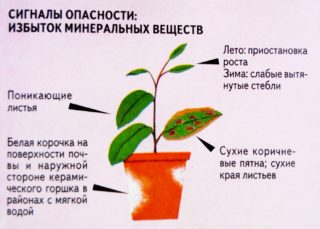 Excess minerals when watering a lawn with water from a well also do not bring vegetation benefits. From an excess of iron and calcium, vegetables, berries, and fruits often die. Moreover, the owners of the garden and the garden observe characteristic yellowness or rust on the leaves. Such impurities destroy plants and adversely affect crop quality. Vegetables, berries, and fruits grown under such conditions are extremely dangerous for both humans and animals.
Excess minerals when watering a lawn with water from a well also do not bring vegetation benefits. From an excess of iron and calcium, vegetables, berries, and fruits often die. Moreover, the owners of the garden and the garden observe characteristic yellowness or rust on the leaves. Such impurities destroy plants and adversely affect crop quality. Vegetables, berries, and fruits grown under such conditions are extremely dangerous for both humans and animals.
If the analysis showed excessive saturation of the liquid with minerals, it is better to immediately install a good water purification system, because the owner of the site uses it for domestic purposes.
Calcium and iron have a particularly negative effect on such crops:
- coniferous trees;
- Apple tree;
- viburnum and mountain ash;
- hydrangea;
- lily of the valley;
- maples and other lovers of acidic soils.
In addition to the fact that the admixture of iron has a negative effect on the soil and plant crops, it very quickly disables all nozzles and other metal elements of the irrigation system. The same effect is observed from resources oversaturated with chloride salts or limestone. Salt water should not be watered at all. All living things will gradually perish.
Manganese is seriously burning the soil. Later it becomes unsuitable for planting and growing plants.
Water saturation with oxygen
Moisture supplied from the well is practically not enriched with oxygen. It is undesirable to irrigate garden and garden plants with such a liquid. The exception is when water is supplied through drip irrigation systems or sprinklers. If watering is carried out through a hose directly from the source, you can not talk about saturation of the O2 resource.
To saturate the water taken from the well with oxygen, you need to make special settlers for it: large barrels, vats, a pool. First, they are filled to the top and allowed to be filled with life-giving gas.
Is it necessary to heat water from a well before irrigation
Experts say that heating is the only way to protect the garden, lawn, vegetable garden from death. Borehole water is filled with special storage tanks. In them, the liquid should settle for about a day or more. During this period of time, the following will happen:
- Water will warm up to the optimum temperature. As a result - the exclusion of shock in plants during their irrigation.
- It will be saturated with oxygen, become lively, suitable for moistening the soil, the root system of crops.
- It settles, as a result of which all iron ions oxidized by oxygen will precipitate. It does not require an expensive cleaning system.
- Carbonate salts will linger on the walls of the storage tank.
- The density of the water will change in height. Its upper layers will be less mineralized. Use moisture from this part of the drive.
Thus, a natural liquid purification is obtained. It is desirable to have such a volume of storage tanks so that it is possible to gradually add new liquid into them, taking some of them earlier.
It is allowed to ignore the temperature regime if water is supplied by aerators. Liquid droplets warm up in the air before falling to the ground.
To qualitatively moisten the soil in the garden, garden, on the lawn during the hot period, 500-1000 liters of water should be used for 1 hundred parts of the site.
